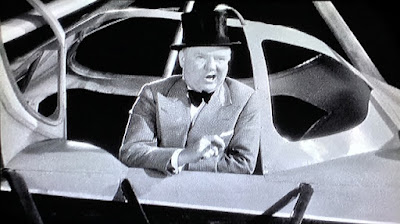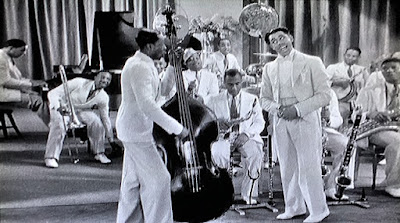 |
| Peggy Hopkins Joyce: 'Now can you see anything?' Fields: 'Practically everything.' |
Film reviews. We welcome all readers and do not collect data or try to sell anything to anyone.
Monday, January 15, 2024
Anything goes
Friday, January 12, 2024
American Fiction
American Fiction introduces an upper middle class Black family of doctors—one a doctor of literature—coming together to decide what to do about Mom when she can no longer take care of herself.
They are a literature PhD, his departed ob-gyn father’s favorite teased by his siblings as “Doctor Dictionary,” on an enforced leave of absence from his West Coast faculty for offending undergraduates’ tender identological sensibilities; his sister who stayed closest to home in Boston, a divorced ob-gyn in a family planning clinic; and their brother, a divorced plastic surgeon in Tucson who lost his wife, half his practice, and his kids’ respect after his wife caught him in bed with a man.
 |
| Thelonious
“Monk” (Jeffrey Wright), Agnes (Leslie Uggams), and Lisa Ellison (Tracee Ellis Rose) in Cord Jefferson's American Fiction |
The Ellisons are Thelonious “Monk” (Jeffrey Wright), Lisa (Tracee Ellis Rose), Clifford (Sterling K. Brown), and mater familias Agnes (Leslie Uggams), with lifelong family retainer Lorraine (Myra Lucretia Taylor) and her willin’ Barkis, Maynard (Raymond Anthony Thomas). This cast clicks, and makes a pretty party of it.
On the surface, writer and director Cord Jefferson gets the most laffs playing stereotypes, breaking Black Lives Matter’s new bottles with the old wine of Tom Wolfe’s “radical chic”. It may well be that there is no more fraught person in the United States than an American who resembles by race people first brought by force to work enslaved to British colonists. The anger at the core of this story, passed from father to son though not only, is rooted in the frustration of feeling forced lifelong to fulfill the impossible range of so many of each others’ and other Americans’ expectations. For this we expect that Jefferson’s film adaptation of Percival Everett’s original “Erasure” (2001) should be a shoo-in favorite for best adapted screenplay.
Monk is bummed because as a scholar of comparative literature with a successful if modest academic publishing record—“I read your book!” “Oh, so you’re the one.”—he is not allowed to be a dead white guy. Not that Monk has the least desire to be dead or white: He aches for discerning readers to accept his close readings and analyses of subjects such as an Aristophanes play on their merit, not the author’s jacket photo. In a chain bookstore Monk angrily moves copies of his books from the “African-American” section to general literature as a timid young white employee looks on blinking his eyes. Monk is the more bummed when he eyes in the general literature section a publisher’s display stacked with copies of “We’s Lives in da Ghetto” the blockbuster bestseller by Sintara Golden (Issa Rae) which he has made a point NOT to read, especially after hearing Golden read and discuss it at a book festival. Looking after his mother, Monk meets Coraline (Erika Alexander), a lovely neighbor across the street from his parents’ summer home. (The book is set in Washington, D.C., and on the Chesapeake Bay in Maryland.) But Monk strains under the pressure of his anger as his father before him; circumstances further pressure him to take full responsibility for committing his mother to one of the gilt facilities in which Americans install their elderly, to the tune of $5600 per month. His tension and anger play out in an intellectual game, a process best left to the medium of film: It is a treat to watch Wright carry the picture as he banters with the material. This and Everett’s original coolly complement each other.The final shot pans skyward from a Hollywood studio lot to strains of Cannonball Adderley’s warm classic version of “Autumn Leaves” with Miles Davis; odd though not to hear a single note of Monk’s legendary namesake.
American
Fiction
2023
U.S. (157 minutes) Metro-Goldwyn-Mayer/Orion Pictures/T-Street.
Directed and adapted by Cord Jefferson from Percival Everett’s 2001
novel “Erasure”; cinematography by Cristina Dunlap; editing by
Hilda Rasula; production design by Jonathan Guggenheim; casting by
Jennifer Euston; music by Laura Karpman; produced by Jefferson,
Jermaine Johnson, Nikos Karmigios, and Ben LeClair.
Wednesday, January 10, 2024
To live like God in France
 |
An episode series title across the landmark Judicial Police Building, 36, Quai des Orfèvres. |
"To live like God in France" speaks more for the French way of life than the rough ride the French have given that old worthy since the 1789 Revolution.
Fabien Nury’s Paris Police 1900 reimagines the cop-show table d’hôte to serve tastes of the lives of historical, loosely-based, and fictional Parisians inhabiting roughly the lost time Marcel Proust recovered in his great work, though many at the social margins as in modern police series. Here the investigation of a woman’s murder rolls back a rock to expose an array of social and political evils at a fraught historical moment.
The Belle Époque period sets and details, colors, costumes, lighting, and casting match the best of Masterpiece Theatre. And like cop shows set in later periods, these eight 55-minute episodes move quickly without explaining historical or cultural references unless the details bears on solving a crime. Each episode jumps into the narrative with a set-up scene followed by a block-letter stencil of the title overlaid on a photograph, without theme music and title credits. Full credits roll at the end of each episode.
The series breaks fast with a Happy-Birthday-Mr.-President moment that becomes a police matter. The scene is best seen unawares and unsuitable for children. A senior interior ministry official dubs the agent “Pompe funèbre” (funeral pump), a grammatical singular turned on the familiar French plural pompes funèbres (funeral ceremonies) but lost in the subtitle’s “Deadly Lips”. This triggers a political crisis which antisemitic demagogues are quick to exploit, prompting further police action. This review provides only political and historical contexts and identifies key characters to orient viewers.The opening scene is a Parisian urban legend. We alluded to the Yiddish expression lebn vi Got in Frankraykh because European Jews generally saw France as a good place to live. They made up less than .2 per cent of the French population in 1900; most lived in Paris. They had roles in public administration, the military, and academia in addition to financial services and trades they commonly plied elsewhere. French conservatives worried more about liberal-secularist gentiles removing the Catholic Church from public administration, such as laws in the 1880s that universalized and secularized public education. However, inspired by the vehement anti-Semite Édouard Drumont, demagogues whipped up public outcry over a purported “Jewish syndicate” pulling strings behind the scenes, bankrolled by the Rothschilds. The Panama Scandal of the early 1890s over political corruption and insider financial dealing related to Panama Canal construction gave Drumont and his allies purchase. But the Dreyfus Affair threw a dramatic glare on purported Jewish shenanigans. France started and lost a war with Germany in 1870-71, losing its northeastern territories Alsace and Lorraine to a Germany unified for the first time. The newly-declared German Empire joined the imperialist rivalry for overseas colonies. Into this mix, Captain Alfred Dreyfus, a French general staff officer with “poor people skills”, was arrested in autumn 1894, tried, and convicted of spying for Germany. Dreyfus, an Alsatian Jew, was proved in the end to have been framed. But the strong emotions this case inspired brought to a head long-ongoing, sometime violent political clashes between republican liberal-secularists—refashioned Dreyfusards—and conservatives (the army, royalists, Catholic traditionalists, anti-Semites and anti-Masons)—anti-Dreyfusards—in fights that continued for a decade. It also established in France the political antisemitism which would reappear in the 1930s. The series plots unfold as though “ripped” from contemporary tabloids. Many involve the above-noted “Funeral Pump”, Marguerite “Meg” Steinheil (Evelyne Brochu), an historical figure of the Parisian demi-monde whose published memoir recounts her vie dangereuse-coquine at a time when women had practically nonexistent professional opportunities though missed little of what was going on around them. She supports her husband Adolphe (François Raison), a minor commercial portraitist and painter twenty years her senior, and their daughter Marthe (Mila Ayache).Antoine Jouin (Jérémie Laheurte), a headstrong young Paris police inspector, is an invented character who serves as narrative bridge between the action on the ground and characters driving it behind the scenes. Jouin loses his first partner investigating an adultery case; his first murder case is that of a police informer whose torso is found in a suitcase floating on the Seine, her arms, legs, and head under the floorboards of her rented room. Jouin’s love interest is Jeanne Chauvin (Eugénie Derouand), degreed in law at a time women were not permitted to practice and a dab hand with a derringer. Associated with Albert Weidmann (Nicolas Bouchard), a middle-aged Jewish lawyer, she provokes dismissive guffaws among policemen when she appears to represent a man seeking damages against anti-Semites who burned down his newsstand and accused him of the beating they gave his son.Drumont (Eddie Chignara), at the time a French lower-house legislator, and his anti-Semitic allies the Guérin brothers Jules (Hubert Delattre) and Louis (Anthony Paliotti) guided by their evil-genius “Maman” (Anne Benoît) are historic. So are the Anti-Semitic League, League of Patriots, and anti-Semitic butchers of La Villette, site of a former livestock market and slaughterhouse in the 19th Arrondissement (La Villette also was home to a Jewish community), right-wing power-broker Comte Henri de Sabran-Pontevès (Yann Collette), an aristocrat from Alsace, his son Gabriel (Christophe Montenez) and, on the other side, Sébastian Faure (Yanik Landrein) and his anarchist collective. Also historical is the steely-eyed, sardonic Préfet Louis Lépine (Marc Barbé), the former Paris police chief whom Prime Minister René Waldeck-Rousseau (Steve Driesen) brought back to restore order in the capital when Dreyfus was returned to France from Devil’s Island for retrial. The French police then as now are a federal agency which combines law enforcement and military functions, thus answer to federal leadership not local government. Lépine modernized the Paris police, professionalizing training, installing telephones in station houses, and providing officers with bicycles. His crime-scene analysis section is headed by the historic Alphonse Bertillon (Christian Hecq). But his refined wife Marie (Valérie Dashwood), addicted to opioids, is a target for his enemies: Lépine must contend with Puybaraud (Patrick d’Assumçao), whom he describes as “patient and slippery as an eel”: a deeply cynical, underhanded interior ministry official passed over for police commissioner, whose protégé Inspector Joseph Fiersi (Thibaut Evrard), is a hard man but a good cop.The series is a treat. The episodes fly by quickly engaging eye and ear in the great care taken with sets, costumery, and look of the production; actors from principals to child extras are interesting to look at and listen to, though subtitles can gloss over telling details. We found it rewarding and easy to watch episodes several times. There is a six-episode follow-on series Paris Police 1905 (2022). Paris Police 1900 (2021) France. StudioCanal International/Canal+/MHz. Created by Fabien Nury; produced by Emmanuel Daucé (creator of the series Un village français) and Laurent Cavalier; series production design by Pierre Queffelean; series art direction by Clovis Weil and Matthieu Beutter; series costume design by Anaïs Romand; series casting by Okinawa Valérie Guerard.
















